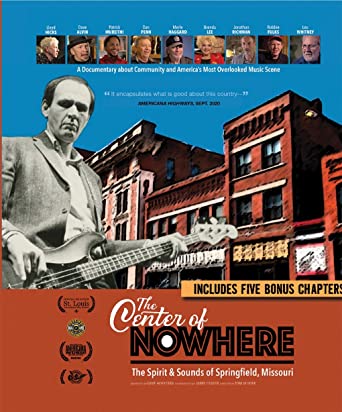
Dave Hoekstra’s riveting new documentary The Center of Nowhere: The Spirit & Sounds of Springfield, Missouri, manages to weave together many strands of sight, sound, and place. It revolves around the almost impossibly rich music of Springfield, Missouri during the past 70 or so years, and the super-talented people who have made and produced it. It also touches on being the birthplace of Route 66, the influence of race on the music, and how an out-of-the-way city came to have such a widespread musical impact, especially in rock and country. We also learn, among other things, that deep-fried Chinese-American cashew chicken originated in Springfield, and that Brad Pitt is a local-boy-made-good.
The heart and soul of the film is Lou Whitney, the musician and producer who had a major influence on other musicians and music lovers in Springfield and elsewhere for many years, until his death from cancer in 2014. Hoekstra’s labor of love project, which took seven years to complete, has considerable footage of Whitney in the several years leading up to Lou’s death. It would take too long to enumerate all of his activities, including owning/operating a recording studio, and leadership of the excellent bands The Skeletons/Morells/Symptoms. But the documentary demonstrates how crucial he was as a backbone to the area’s scene, and a mentor/father figure/philosopher to so many musicians, songwriters, and listeners. Had he never moved there years earlier from Tennessee; it seems unlikely that the city’s music scene would have developed the way it did.
However, that is not to downplay the many other people and institutions described in the film that have given the city’s music its character, starting with the late producer Si Siman and his Ozark Jubilee live radio show, which morphed into a 1955-1960 national series on ABC-TV. Siman’s son Scott, a country music executive in Nashville, is interviewed by Hoekstra, as is one of the stars of Ozark Jubilee, Brenda Lee, who first reached a national audience there at the age of ten. Springfield was also the home of the ‘70s hitmakers Ozark Mountain Daredevils (original member Michael “Supe” Granda is interviewed here), songwriter Wayne Carson (The Box Tops’ “The Letter,” “Soul Deep” and many others), and the late Ronnie Self, who wrote such hits as Lee’s “I’m Sorry.”
In the film, Hoekstra interviews many of the musicians who made the trek to the “the Center of Nowhere” to record at Whitney’s studio, such as Jonathan Richman, Dave Alvin, Syd Straw, The Del-Lords, Robbie Fulks, Mary McBride, and more. Some of these artists pay tribute to musicians from various permutations of Lou’s bands (including guitarist D. Clinton (Donnie) Thompson, drummer Bobby Lloyd Hicks, and keyboardists Joe Terry and Kelly Brown), who provided first-class studio backup in the tradition of ‘house bands’ such as Los Angeles’ The Wrecking Crew, Muscle Shoals Rhythm Section, various Nashville players, and Booker T. & The M.G.s, when they were the house band at Memphis’ Stax Records.
In a further reminder of who the city has lost, Bobby Lloyd Hicks, who provides engaging commentary in the film, died in 2017. Others who have passed away in recent years are singer Jim Wunderle (of The Symptoms and many other Springfield bands), in 2012, and country music legend Merle Haggard, who though not from the area, discusses Springfield in the film in one of his last interviews before his death in 2016.
I wrote about my personal history with Whitney, Thompson, Wunderle, and some of the others in my October 13, 2020 post “Declaration of Independents 40 Years On.” In 2012, I wrote about “The classic roots-rock of Springfield, Missouri,” a post for Americana One (then called Sun209). I also discussed these topics with Springfield’s Dale Wiley, on his podcast last year. Dale has long been an integral part of the Springfield scene, including leading Slewfoot Records, which released a self-titled album by The Morells in 2001. Wiley, who is interviewed in the film, has further documented the city’s musical history and heritage in his podcast interviews with Hoekstra, Thompson, and others.
Hoekstra was a longtime journalist for the Chicago Sun-Times who continues to be a prolific writer, author, and broadcaster. He also wrote and co-produced a 2002 WTTW Chicago Channel 11 PBS documentary, “The Staple Singers and the Civil Rights Movement.”
The Center Of Nowhere has a timeless quality, in its respectful yet light-touch approach to Springfield and its importance to the history (musical and otherwise) of the United States. The music throughout is compelling, as is the commentary. The documentary makes plain that whether or not it’s really the center of nowhere (much different from being in the middle of nowhere), Springfield’s music remains alive and vital.
